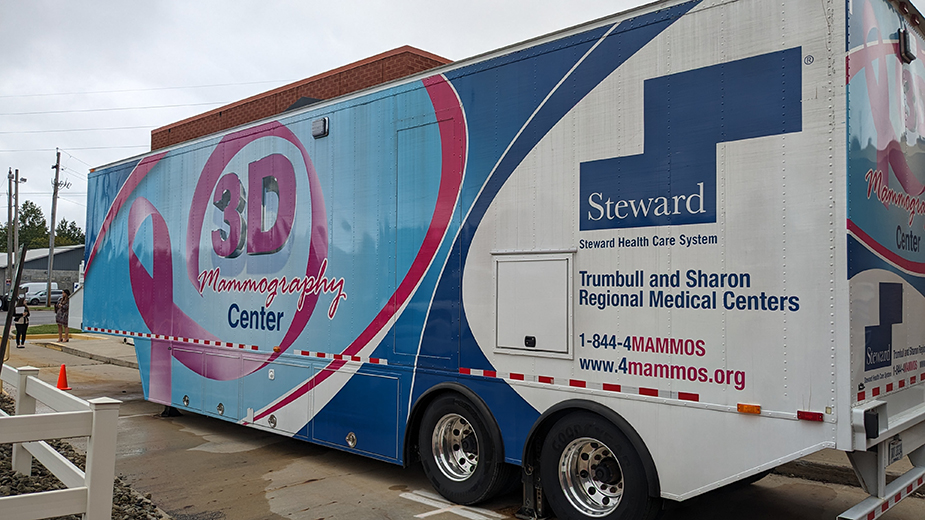BOARDMAN, Ohio – To help women who lack transportation, local health care clinics are using mobile units to bring breast cancer screenings to patients.
Tiffany Breast Care Center of Boardman’s mobile unit serves 17 to 20 patients per day, says Sandi Bruff, lead technologist and office manager.
“Last year we served a total of 2,283 people,” she says. The mobile unit makes stops throughout the tri-county area and in western Pennsylvania.
“We are usually out daily,” Bruff says.
Breast cancer accounts for about 30% of all new cancer cases in women each year in the United States and 12.5% of all new annual cancer cases worldwide, making it the most common cancer in the world, according to BreastCancer.org.
The American Cancer Society suggests women ages 45-54 get mammograms every year and those above age 55, every other year.
“When preventive screening is more convenient, more people get screened,” Bruff says. “The importance is bringing [the service] closer to them.”
Bruff says there is always a need for health-related care to underserved areas. She says people are more inclined to use services when they are brought to them.
The mobile unit also makes stops at corporate events for local businesses, Bruff says.
“Early detection is key,” she says. “Yearly screening mammograms, monthly self-exams and a clinical breast exam by your doctor equals the best breast care possible.”
Bruff says early detection means more treatment options and better chances of stopping the cancer’s spread.
“Finding it early is key to survival,” she says. “It’s not a death sentence anymore. Breast cancer can be treated.”
For the months of October and May, Tiffany Breast Care Center offers mammograms at a cost of $60. Insurance is still applicable to services on the mobile unit.
Those wanting to make an appointment or check to see when the mobile unit will be near them should call the main office at 330 629 8634.
NEW TECHNOLOGY
A welcoming registration area, two patient changing rooms and a Hologic 3D unit can be found at the Steward Mammography Center in Austintown.
The Genius 3D Mammography mobile unit is equipped with the technology to detect 20-65% more invasive breast cancers than 2D mammograms, according to Alexa Polinsky, marketing director.
Polinsky says the unit served 7,446 patients in 2022 and more than 10,000 patients since its launch in 2021, screening 25 to 35 patients daily.
“It has changed quite a bit the way that we look at the mammograms,” says Koula Coliadis, Steward diagnostic interventional radiologist and chairman of radiology.
Coliadis says the 3D unit separates the breast images into sections. Before the 3D unit, one picture captured all the depths together.
“The 3D unit lets us take it apart like slicing bread. So you are able to look at the image in more detail,” she says. “The main advantage is a lot of the things we would have seen before we had the 3D unit, we would have to bring the patient back for further imaging.”
The ability to sort out several layers of tissue minimizes the number of callbacks the facility has to make, Coliadis says.
The mobile unit serves Trumbull and Mahoning counties.
“Mammography is a very important tool,” she says. “It is not only a tool for helping to detect breast cancer but the earlier that breast cancer is detected, the better it can be treated and the higher chance of survival that a woman would have.”
Those with first-degree relatives who have breast cancer, such as parents and siblings, are most at risk.
Coliadis says some people also have abnormal genes that make them more susceptible to breast cancer.
“One out of 100 breast cancer cases are actually in males,” Coliadis says. “They may or may not have symptoms.”
Coliadis says common symptoms for males include itchiness, palpable lumps or discharge. She says most men already have symptoms before coming into the office because they are not routinely screened.
“One of the other myths is that women don’t need to get screened if they don’t have a relative that has breast cancer,” she says.
“That’s not true,” she continues. “Only about 10-15% of all cancers in women are in people that have family histories. Approximately 85-90% of all new cancers are in people that don’t have a family history.”
Coliadis says she believes there is always a need for more mammography and outreach services.
“One in eight women in their lifetime is expected to develop breast cancer,” she says. “It’s a high number and it’s very important for women not to ignore that part of their health.”
Appointments can be made by calling 1 844 4MAMMOS or by visiting 4Mammos.org.
Pictured at top: As many as 35 patients are screened daily inside the Steward Health Care System 3D Mammography Center.
